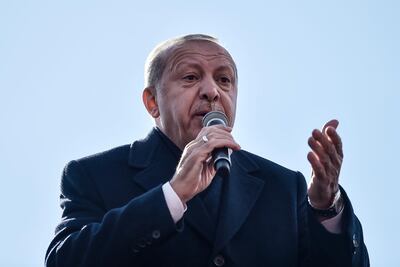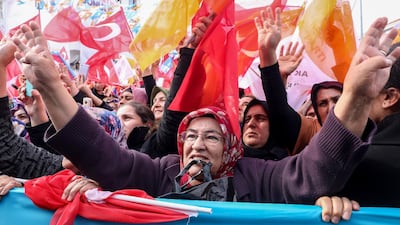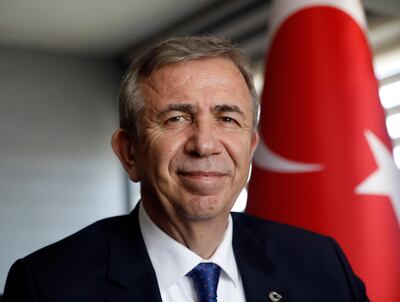Sitting in the Ankara offices of Turkey’s Iyi Party, Guclu Senel, a candidate for one of the country’s largest districts in Sunday’s local elections, voices a common complaint among opposition nominees.
"I'm not competing with the rival candidate, I'm competing with the president," he said in an interview this week.
With 57 million voters heading to the polls on Sunday, President Recep Tayyip Erdogan has been at the forefront of the campaign by his Justice and Development Party (AKP) to retain control of Turkey's biggest cities.
Although the nationwide elections are for mayors, local councils and neighbourhood officials, Mr Erdogan, who heads the AKP, has embarked on a gruelling schedule of rallies and TV appearances. Posters featuring his image are as prominent as those of local candidates.
“When you go on the streets you see AKP billboards and posters everywhere,” said Mr Senel, who is standing for mayor in Ankara’s Kecioren district, the second most-populous in Turkey.
“Even though we managed to hang the same number as them, the ones we put up are removed overnight. It has been an unequal, unjust competition. All the state apparatus has been used to support their own candidates.”

The AKP has run Turkey since 2002 and metropolitan municipalities in Ankara and Istanbul have been controlled by the party or its predecessors for a quarter of a century. Mr Erdogan, who secured enhanced presidential powers for himself last year, clearly sees the vote as a plebiscite on his rule.
However, amid economic turmoil, and for the first time facing a local election contested largely between two alliances, the ruling party faces its toughest challenge yet.
Mr Senel’s Iyi Party, which was formed in a 2017 split from the Nationalist Movement Party (MHP), has continued an alliance with the main opposition Republican People’s Party (CHP) and the smaller Saadet Party forged ahead of last year’s presidential election. The AKP is paired with the MHP.
The pro-Kurdish Peoples’ Democratic Party (HDP) is not part of the opposition alliance but is not fielding mayoral candidates in the six largest cities – Istanbul, Ankara, Izmir, Bursa, Antalya and Adana – to avoid splitting the opposition vote.
This co-operation has allowed Mr Erdogan to accuse the opposition of supporting terrorism as he has long alleged that the HDP is the political ally of the Kurdistan Workers’ Party (PKK), which has waged a four-decade war against Ankara that has led to tens of thousands of deaths. The HDP has denied having links to the PKK.
In a speech in Ankara earlier this month, the president accused the opposition of carrying out “negotiations with the separatist terrorist organisation” and added: “They can no longer hide their dirty co-operation and bloody negotiations. This alliance has everything except patriotism and nationalism.”
He has also accused the opposition of colluding with the group said to be behind a coup attempt in 2016 as well as with “foreign powers” intent on undermining Turkey.
The campaign has seen Mr Erdogan focus on international issues such as the New Zealand mosque shootings and US recognition of Israel’s sovereignty over the Golan Heights. While he has cast the polls as vital to ensuring Turkey’s very survival, critics have accused him of trying to deflect from domestic problems.
This week has seen further pressure on the lira, which lost a third of its value against the US dollar last year, and the country faces recession with inflation at 20 per cent and one in 10 workers unemployed.
In a recent survey by the Social Democracy Foundation, 65 per cent of voters said the economy was their main concern.
“With the strong influence of the financial crisis, the effect of government propaganda is diminishing day-by-day because people have no money or food,” Mr Senel said. “They say ‘Let’s give the government a lesson’.
“The people are living this economic crisis. They feel it in their pockets and in their stomachs. What they see with their own eyes and what they’re told by the government and its media are totally different.”
When the polls close at 5pm, most eyes will be on the capital Ankara, where Mansur Yavas, the CHP mayoral candidate, is expected to defeat the AKP’s Mehmet Ozhaseki. It is the third time Mr Yavas is standing for the job, having narrowly missed out to AKP incumbent Melih Gokcek in 2014 amid accusations of ballot-rigging.
“While the AKP had consistently won elections since coming to power in 2002, the March 2014 elections... were the first indication that electoral manipulation had entered the party’s playbook,” said Lisel Hintz, an assistant professor in international relations at Johns Hopkins University.
In Istanbul, where Mr Erdogan cut his teeth as a young mayor, the race between former AKP prime pinister Binali Yildirim and CHP candidate Ekrem Imamoglu is closer but there is still the risk of an upset for the ruling party.
Mr Senel likens the mood around these elections to 1989, when then prime minister Turgut Ozal’s Motherland Party was beaten into third place, losing nearly all major cities.
“Thirty years ago we had the same thing,” he said. “From my experience, I can say that the atmosphere is identical. This should be a big warning to the president and his party.”


